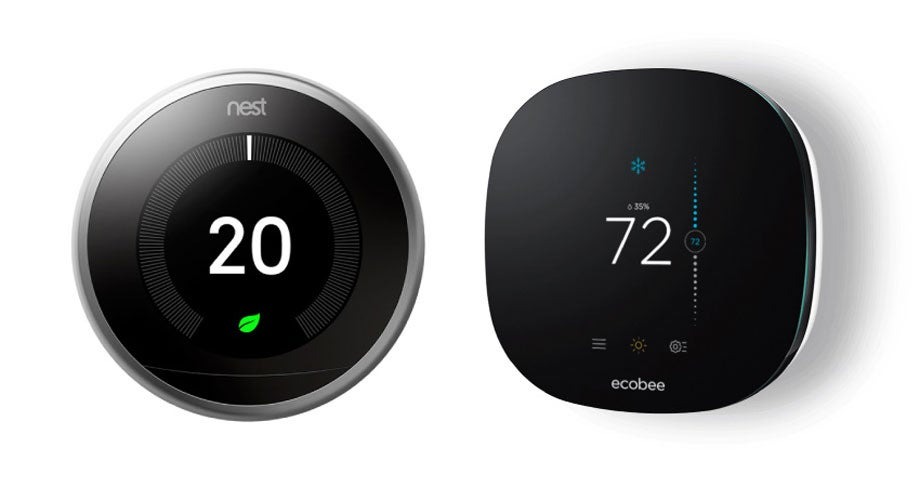
Find out what solar panels cost in your area
According to a study by EnergyStar, heating and cooling account for 42% of the average American’s electric bill. One of the easiest ways to cut down these expenses and save money is by installing a smart thermostat.
Two of the most popular smart thermostat brands, ecobee and Nest, are able to help you reduce your electricity bills. But which of these smart thermostats is the smartest?
In this blog, we’ll take a look at some of the key features of these smart thermostats to see how they stack up.
Why get a smart thermostat?
Smart thermostats are the newest way to control your home’s climate. Just like a traditional thermostat, smart thermostats will connect to your heating and cooling system so you can adjust the temperature.
What’s unique about smart thermostats is that they connect to your home’s WiFi too, which allows them to offer a variety of advanced features that your traditional thermostat can’t.
These features not only allow you to get the temperature of your home just right, they can actually cut down your energy bill. They do this by setting temperature schedules, monitoring when you’re home, and sensing when you enter or leave a room - all of which helps you save energy.
The ecobee smart thermostat and the Nest learning thermostat are two of the most popular brands on the market, but how do you know which is right for you?
ecobee vs. Nest: at a glance
Before we dive into what exactly the ecobee 4 and the Nest Learning Thermostat offer, let’s take a look at their specifications.
Feature | Nest Learning Thermostat | ecobee Smart Thermostat |
|---|---|---|
Price | $149.99 Buy Now | $149.99 Buy Now |
Installation | Self or professional | Self or professional |
C-wire required | No | No |
Device size | 3.3"x3.3"x1.21" | 4.29"x4.29"x1" |
Screen size | 2.0" diameter | 3.5" |
Geofencing | Yes | Yes |
Machine learning | Yes | No |
Scheduling | Yes | Yes |
Occupancy sensor | Yes | Yes |
Smart speaker | No | Yes |
Remote sensors included | No | Yes |
Warranty | 2 years | 3 years |
Smart home integration | Google Assistant, Amazon's Alexa, Nest, IFTTT | Apple HomeKit, Amazon's Alexa, Google Assistant, Samsung SmartThings, IFTTT |
A closer look at ecobee vs. Nest smart thermostats
There are a few key features to consider when you’re looking for the right smart thermostat. We put the Nest and ecobee head-to-head in the following categories to see which one is the best:
Design
Setup and installation
Scheduling
Energy saving benefits
Smart home integration
Sensors
Design
Nest Learning Thermostat
Nest’s smart thermostat is designed to look like a modernized classic thermostat. Its round, stainless steel outer ring makes it easy to blend into any decor.
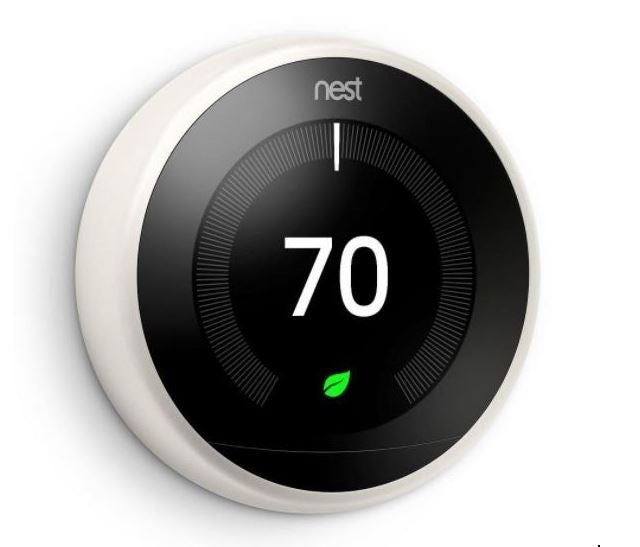
You can also choose between six other colors for the Nest so it can easily match any of the rooms in your home. The high resolution screen will light up blue when cooling your home, and orange when heating your home, making the temperature reading easy to spot, even from a distance.
ecobee SmartThermostat
The ecobee SmartThermostat has a square shape that resembles your typical programmable thermostat. It has a larger screen, but the base of the ecobee is made of plastic, not stainless steel like the Nest.
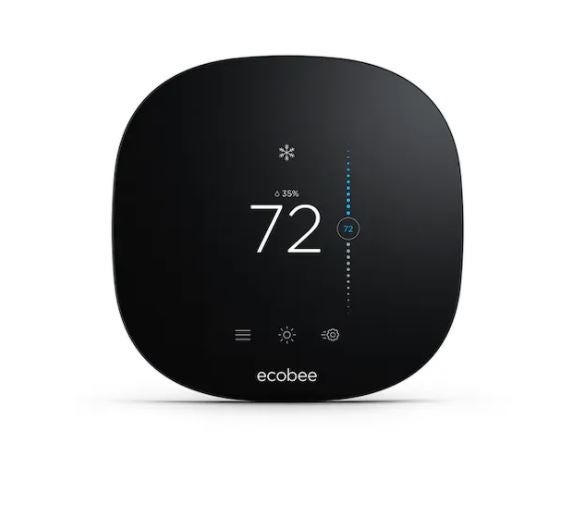
However, the ecobee does have a touchscreen feature that makes it easy to control your settings right from the thermostat, instead of having to rely on your smartphone and the app.
Winner
The Nest Learning Thermostat’s sleek design makes it look more like a decoration and less like a thermostat. That, combined with the high quality stainless steel rim and high resolution screen makes the Nest Thermostat the clear winner when it comes to looks.
Set up and installation: Nest vs. ecobee
Nest Learning Thermostat
Setting up a Nest Thermostat is relatively simple. They provide on-screen, step-by-step instructions, as well as a checklist to make sure your thermostat is working. Nest also has a lithium ion battery included inside, which means that it does not require a C-wire to work.
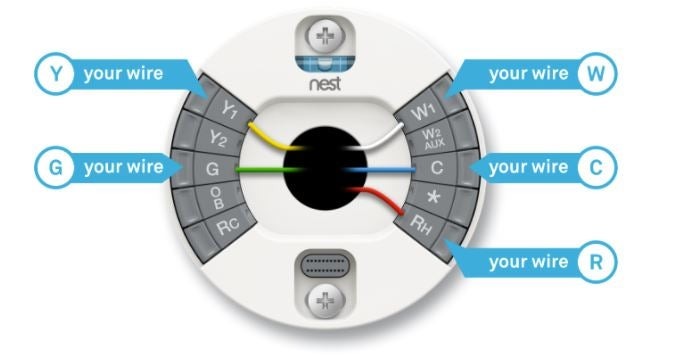
A visual of how to wire a Nest Learning Thermostat. Image source: Google
This is great if your home doesn’t have a C-wire, which is common in many older homes. But be warned - many users have had their HVAC system fail when they didn’t connect their Nest with a C-wire.
ecobee SmartThermostat
The ecobee SmartThermostat doesn’t require a C-wire for installation, but you do at least need to have a four wire setup for your thermostat.
If you don’t have a C-wire you may have to open up your HVAC system, which can be a bit of a hassle. If your home does have a C-wire, then setting up the ecobee SmartThermostat will be a breeze.
Winner
We’re giving this one to the Nest thermostat. Even though both can be installed without a C-wire, it’s much easier to use the Nest because you can power it with a battery and don’t have to worry about the hassle of opening up your HVAC system.
Scheduling
Nest Learning Thermostat
This Nest thermostat has the unique ability to learn your habits. When you purchase a Nest, you program a schedule so that it can adjust your home’s temperature settings based on what you input. As you adjust your thermostat, it will learn these patterns and create a schedule for you.
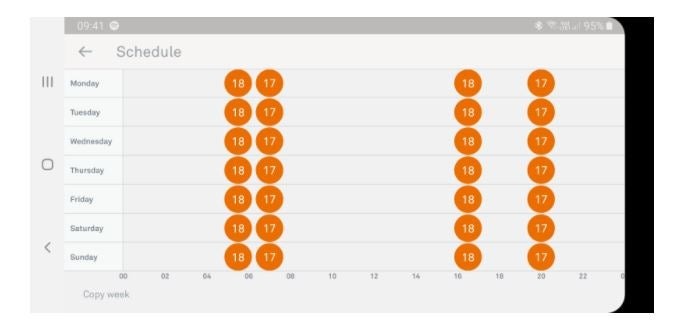
Nest’s temperature schedule. Image source: Google
However, the learning feature might not work as well if you have a sporadic schedule, or a busy household with lots of family members. Also, when you input your schedule, it needs to be done through the app, which has a reputation of being difficult to use.
ecobee SmartThermostat
The ecobee does not have learning capabilities like the Nest. Instead, your input schedule changes manually. So, even if you are regularly changing the temperature at the same time every day, ecobee’s schedule won’t adapt. Instead, you would have to go in and change the schedule yourself.
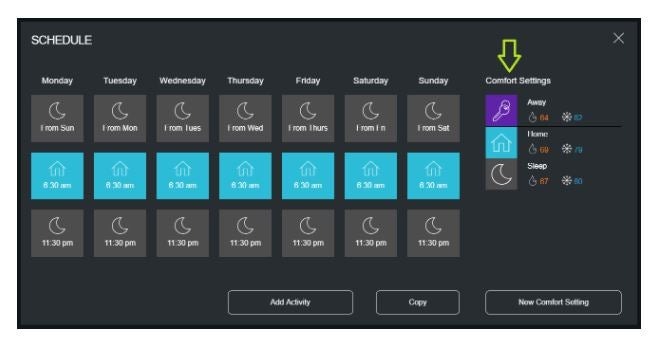
ecobee has an easy-to-program schedule. Image source: ecobee
Winner
The Nest Learning Thermostat comes out on top, simply because of its learning capabilities.
Energy-saving benefits: Nest vs. ecobee
Nest Learning Thermostat
Nest performed an independent study to see just how much Nest users saved on their electric bills. The Nest thermostat saved homeowners between 10% and 12% on their heating costs, and 15% on cooling expenses. The Nest’s learning capabilities also help reduce your energy consumption.
The Nest Learning Thermostat displays a leaf icon, which will show up on the screen whenever you have a temperature set that uses less energy than your previous temperature habits. The presence of the leaf lets you know exactly when you’re saving money, which may encourage you to adjust your temperature more often in order to get the best energy savings.
ecobee SmartThermostat
ecobee also performed an independent study and found that ecobee users saved up to 23% on their heating and cooling costs.
Unlike the Nest, the ecobee SmartThermostat does not have a display that tells you when you’re saving money.
However, the ecobee can adjust the temperature of your house to use less energy when electricity prices are higher, which leads to electric bill savings. This feature is most useful in areas with time-of-use (TOU) electricity rates.
Winner
This is another tie. Both the Nest and ecobee have unique features that lead to energy savings. Which one will save the most really depends on how you use the system.
Nest vs ecobee smart home integration
Nest Learning Thermostat
The Nest is compatible with many smart home programs, including Google Home Assistant, Amazon Alexa, Nest, and IFTTT.
ecobee SmartThermostat
ecobee thermostats are compatible with Apple HomeKit, Alexa, Google Assistant, Samsung SmartThings, and IFTTT. Not only that, the ecobee has a built-in Amazon Alexa speaker.
Winner
The ecobee 4 is compatible with more smart home hubs, namely Apple HomeKit. The fact that the ecobee also acts as an Amazon Alexa is a bonus for smart home device owners.
Sensors
Nest Learning Thermostat
The Nest Learning Thermostat has occupancy sensors and temperature sensors built into the thermostat.
The occupancy sensors detect if you are in a room, so if the room sensor doesn’t detect you, it will adjust the temperature in order to save energy. The temperature sensors monitor the temperature of the room, so the thermostat can adjust accordingly.
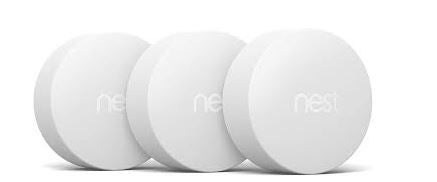
Nest temperature sensors are sold separately. Image source: Amazon
However, this will only work in the room that the thermostat is installed in. So, if you want to get a more accurate read of the temperature in your home, you will need to purchase Nest Temperature sensors separately.
These do not act as occupancy sensors or motion sensors - they only monitor the temperature.
ecobee SmartThermostat
ecobee thermostats also have built-in temperature and occupancy sensors. Unlike the Nest thermostat, ecobee’s comes with an external sensor that detects both temperature and occupancy, allowing you o have a more accurate read on the temperature of your house.
Additional sensors can be purchased to fine-tune the system further. It can also be paired with ecobee home security systems.
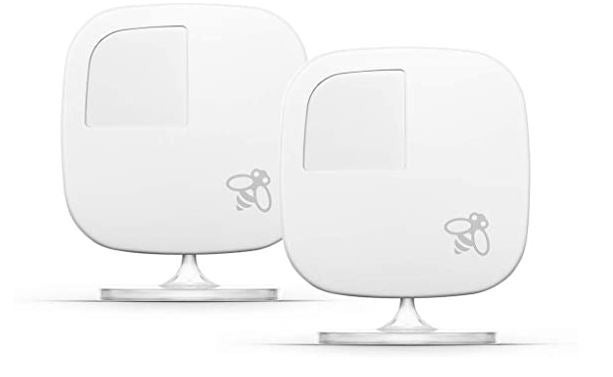
The ecobee SmartThermostat comes with one additional sensor that monitors both occupancy and temperature. Image source: Amazon
Winner
ecobee SmartThermostat’s additional external sensor helps the thermostat have a better pulse on the temperature of your home.
Which thermostat is smarter?
So who comes out on top? The Nest thermostat narrowly beats out eccobee, mostly because of installation. The Nest can be installed easier in most homes and don’t require you to be an HVAC professional to understand how to set it up.
However, this is just based on our six criteria - you can’t go wrong with either one! There is still a lot more to consider when it comes to purchasing a smart device like a smart thermostat. Each of them is better suited for different applications for home automation.
The Nest Learning thermostat is great if you want to install your smart thermostat and forget it’s there. Its learning capabilities make it so you don’t have to do much besides live your life as normal and save money in the process! It’s easy to use, and has a great design.
The ecobee SmartThermostat is best for those looking to take their smart home to the next level. It’s compatible with more smart hubs than Nest and has a built-in smart speaker. The ecobee app design is better for scheduling, too.
Overall, no matter which smart thermostat you pick, you’ll see lower electric bills. To cut your electric bill and carbon footprint even more, consider installing solar panels on your home! See how much you can save when you make the switch to solar using our solar calculator.
Catherine is a solar industry analyst and content manager with five years of experience researching and reporting on residential solar. As the former Written Content Manager at SolarReviews, she led a team producing informative content to help homeowners make informed decisions about solar investments. Her expertise has been featured in Solar Today Magazine and Solar Industry Magazine, with insights cited by major outlets including Forbes and Bl...
Learn more about Catherine Lane